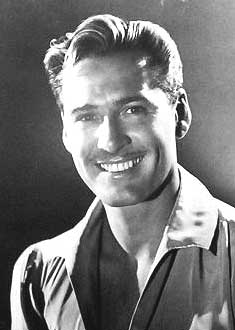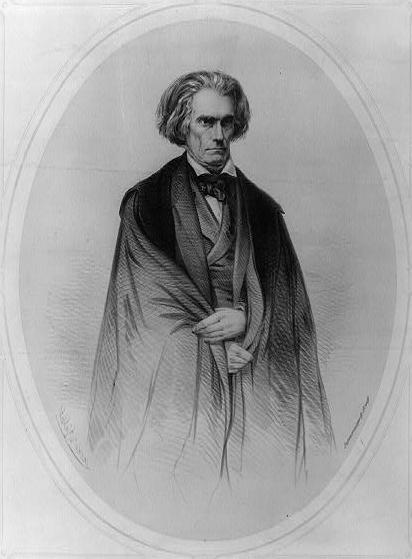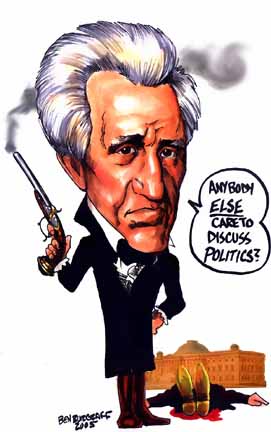(Yes, my use of the word "exposition" was intentional.)
After the War of 1812, British goods started flooding the American market. To protect and encourage American industry, the Tariff of 1816 was enacted. This made British goods more expensive so that people would buy American-made products instead. This tariff was great for the North especially, since it was well on its way to becoming the industrial hub of the nation. For the South the tariff wasn't too great; they were mostly agricultural and helping industry didn't help them too much, and since they bought many goods from Europe, they were afraid of angering the British (since they might make their own tariffs against Southern cotton) and it just made the things they liked to buy more expensive. Eventually much of the South decided to just go with the tariff for national interest; America needed it and it would probably be repealed in a few years, right?
Andrew Jackson, as pictured during his service in the War of 1812.
They were wrong. The tariff wasn't repealed. Southern cotton went to Britain, which gave America lots of money. With all this new money, industrialization could just get stronger in the North since it could be widely financed. The South didn't industrialize, while the North did. As industry and the North grew, people tried to get more protective tariffs to make it grow even more. The whole thing was a bit self-perpetuating.
There was another tariff in 1824 which basically raised the 1816 tariff rates. This was the first time that many Southerners (who had supported the 1816 tariff) actually began to out right oppose raising the tariff rate. Many believed that this new tariff was not in national interest, but sectional interest, favoring the North and hurting the South. States that were part of the original Southern colonies were also going through some tougher times, so the tariff wasn't exactly appreciated. Among the opposition to the tariff was then Vice President John C. Calhoun from South Carolina, who had previously supported the 1816 tariff in order to raise revenue for the country. Like many other Southerners, he believed that this tariff was an unfair burden on the South and was purely for the North's benefit. There was also some opposition in New England against it among traders. (This tariff was pretty sectional, so you can't really blame the opposition for getting annoyed with it.)
This picture of Errol Flynn is unrelated to anything I have to say in this post.
Frustrated, Calhoun went back to his plantation in South Carolina and wrote a pamphlet entitled "Exposition and Protest." In it, he endorsed and argued for the idea of nullification, which says that a state may nullify (choose to ignore) any federal law that it finds to be unconstitutional. (He also said that if a state should decide to nullify, then a vote could be held among the states and if 3/4 ruled that the law was not unconstitutional, the nullifying state would have to follow suit with the law.) Accordingly, because the Tariff of Abominations was so one sided, South Carolina had every right to nullify the tariff should it choose to.Calhoun also went further to suggest that states could secede from the Union if the federal government proved not to be acting in its best interests and only harming it.
Here's an excerpt from the pamphlet. It sums up his thoughts on the 1828 tariff in brief:
"...the whole system of legislation imposing duties on imports, not for revenue, but the protection of one branch of industry at the expense of others, is unconstitutional, unequal, and oppressive, and calculated to corrupt the public virtue and destroy the liberty of the country...so partial are the effects of the system, that its burdens are exclusively on one side and its benefits on the other."
John C. Calhoun: yes, he wore a cape..
Calhoun wrote this anonymously so as not to get himself into too much trouble just yet, since he had his eye on succeeding Jackson as president or getting the office some time or other, (which never happened and was never going to happen anyways once 1828 came along) but many people suspected that he had written it anyway. In case you were wondering, Exposition and Protest did not have an effect on the proceedings regarding the tariff, but it did irk Jackson. Although he liked small government and state's rights, he believed in the Union, and thought nullification and secession were treasonous things to do to it. By 1832, nullification had become a topic of national debate. To calm the situation down, a revised tariff was created, but South Carolina was still not happy with the tariff rate it had set; it was still too high. Later in that same year, South Carolina (Calhoun's home state) decided that it'd had enough, and passed the Ordinance of Nullification to effectively nullify the 1828 and 1832 tariffs. The Nullification Crisis had officially begun! *drum roll*
Look what I found...
Jackson was highly displeased with S.C., and he was a guy that you probably didn't want to annoy. In 1833 he issued the Force Bill which would allow the tariff money to be collected from South Carolina by any means necessary. He also sent in the military and warships into Charleston harbor just in case the message wasn't clear enough. The little state smirked, and nullified that bill too.
Meanwhile, some South Carolinians (among others) began to make some extreme rallies and movements in support of nullification that were a little radical and could possibly create a volatile situation. Calhoun was a bit unnerved by this, and with his anger against Andrew Jackson contributing to the decision, decided to resign as Vice President and go spearhead the nullification movement. He joined the Senate (where he would remain 'til the end of his days, almost literally), and formed the short lived Nullifier Party. (It merged with the Democratic Party in 1839.)
On the same day that the Force Bill passed in 1833, Senator Henry Clay and Calhoun, now a senator himself, together authored the Compromise Tariff for a gradual reduction in tariff rates. South Carolina found this acceptable, and repealed the Ordinance of Nullification. Andrew Jackson also dropped the Force Bill, since South Carolina now intended to comply with federal law.
Amusingly, South Carolina kept the now-repealed Force Bill nullified, a fact which Jackson decided to ignore.












